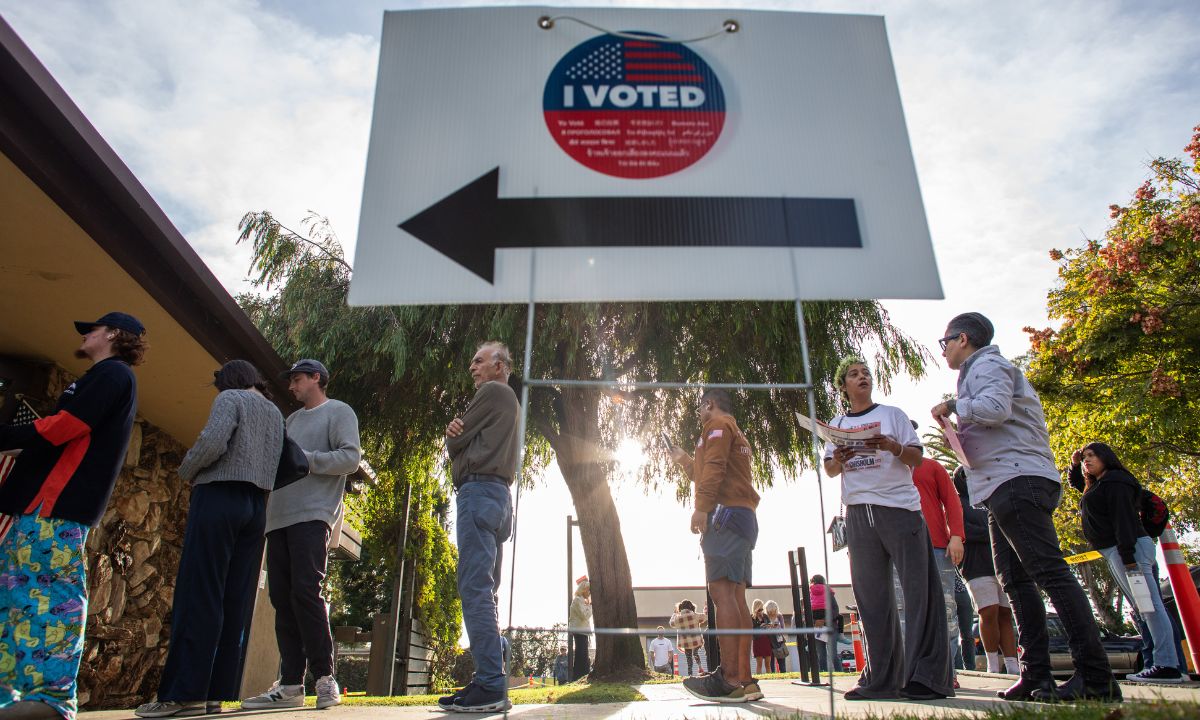LA Voters Overwhelmingly Approve $9 Billion School Bond
LAUSD wants property tax increase to fund improvements to school buildings and other campus projects.

Get stories like these delivered straight to your inbox. Sign up for The 74 Newsletter
Update Nov. 20: LA voters overwhelmingly approved a $9 billion bond measure to repair and upgrade LAUSD’s aging school buildings. Measure US was backed by LAUSD school board members, district superintendent Alberto Carvalho, the teachers union and local construction groups; and passed with 68% of the vote. Measure US would be LAUSD’s largest ever school facilities bond, and would be paid for with property tax increases. The headline on this article has been updated to reflect the vote.
Los Angeles Unified is seeking voters’ approval for a $9 billion bond measure to repair and upgrade its aging school buildings.
The bond, which Californians will vote on Tuesday as Measure US, would be LAUSD’s largest ever and paid for with property tax increases. It requires a 55% majority in order to pass.
LAUSD Board members in August issued a resolution calling for the measure, citing reports from the district that described structural shortcomings and deferred maintenance in the district’s school buildings, which number more than 13,500.
Unlike many other states, California does not set aside funding for school capital projects in its annual state budget. Such projects instead are paid for by bonds issued at the state or local level, which are typically funded by property taxes.
Los Angeles voters often exhibit support for school construction legislation such as Measure US. Headwinds facing the bond include plummeting enrollment in LAUSD, an ongoing budget crunch and a statewide school construction bond on the ballot this year.
Measure US is supported by members of the LAUSD board, district superintendent Alberto Carvalho, the teachers union and local construction groups. It’s opposed by some taxpayer advocacy groups and has been criticized by members of the local charter school community.
Carvalho argued that the bond is necessary at a board meeting to introduce Measure US in August. “I’ve seen firsthand our aging and outdated facilities, in many instances, our subpar learning environments, our lack of green space, our lack of outdoor space,” said Carvalho.
Here are five things to know about the the $9 billion bond:
1. LA’s school buildings need help.
LA Unified, the nation’s second largest district, boasts more than 1,500 schools spread out across 710 square miles. As is often the case in large, urban districts, many of the school buildings in Los Angeles are older, and some are in rough shape.
According to figures kept by LAUSD, at least 60% of the schools in the district were built before 1975. Many of those older buildings need upgrades and renovations such as new roofs, ventilation systems, seismic updates or tech upgrades. According to LAUSD’s own estimates the district needs to replace roughly 50,000 HVAC units, two million square feet of plumbing and 18 million square feet of roofing.
LA Unified school buildings also suffer from a lack of green space and accessible facilities for students with disabilities. Beyond that, the district has also highlighted a need for investment in technology for its schools, such as video camera systems and alarm and monitoring systems to improve campus safety.
2. Not even $9 billion can fix the district’s building problems.
According to the district’s own estimates, $9 billion won’t entirely cover the cost of needed upgrades and repairs to school buildings. Carvalho says the district actually needs at least $80 billion to fully repair and modernize its schools.
Another problem with LA Unified school buildings is that there are too many of them, and they are too big. District officials have said the school system is built for about 650,000 students, but there are now fewer than 410,000 students enrolled in LAUSD schools at district-run TK-12 programs.
With no end to dropping enrollment in sight, a tricky problem facing LAUSD is what to do with all those classrooms when they’re not being used by students. Carvalho has said closing schools is on the table, but so far the district has avoided doing that.
3. The state puts its own, $10 billion school construction bond to voters this year.
State lawmakers have put a statewide bill forward to voters this year for a separate set of school buildings bonds. Proposition 2 would fund repairs and upgrades at public schools and community colleges around the state.
Los Angeles Unified stands to gain just a small fraction of that $10 billion included in the statewide bond from the legislation, an amount that district officials say is far too small to address the facilities needs there.
And that’s not all when it comes to school repairs for California this election cycle – besides the statewide measure and the measure on the ballot in LA, 252 districts around the state also have school building bonds up before voters next week.
4. Charter schools could be shortchanged by LA’s measure.
Measure US sets aside $300 million for charter schools out of the $9 billion total that it seeks to borrow from voters and pay for with a bond.
California Charter Schools Association Vice President Keith Dell’Aquila said those allotments shortchange charter schools, which account for roughly 22% of LAUSD’s enrollment, including district-affiliated schools.
“Twenty-two percent of the students should see and benefit from more than three percent of the revenues,” said Dell’Aquila at an August board meeting to discuss the bond.
“We need to be working in collaboration and partnership,” he added. “We see the same challenges: the leaky roofs, the insufficient special education space, too much concrete and not enough grass, the need to reinvest and modernize our schools.”
Get stories like these delivered straight to your inbox. Sign up for The 74 Newsletter

